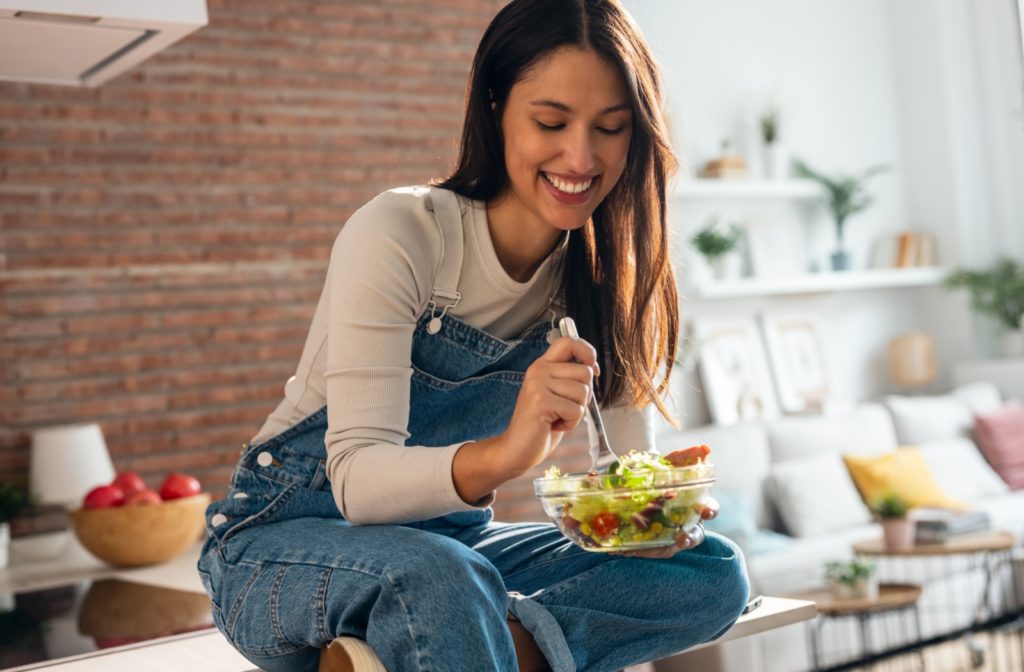Carrots have earned a bit of a reputation as the go-to snack for perfect vision. From childhood, you’ve probably heard that munching on these crunchy, orange veggies can help you see in the dark or improve your eyesight altogether. But how much of this is fact, and how much is just a myth that spiralled out of control?
The truth is, carrots won’t magically give you superhero vision, but they’re still a great friend to your eyes. Packed with Vitamin A, an essential nutrient for maintaining healthy vision, carrots play a key role in supporting your eye health, especially when it comes to preventing certain conditions linked to Vitamin A deficiency.
That said, if your vision is feeling a bit off, carrots alone aren’t likely to solve the problem. Regular eye exams are the real MVPs for catching and addressing issues early. So, while snacking on carrots is great for your eye health, scheduling an appointment with Total Vision Del Mar can help keep your vision in tip-top shape.
The Origins of the Carrot & Eyesight Connection
The belief that carrots improve eyesight dates back to World War II. British propagandists claimed that Royal Air Force pilots ate lots of carrots to develop “night vision,” which helped them shoot down enemy aircraft in the dark. While this clever story was meant to disguise the RAF’s use of radar technology, it left a lasting impression.
Over time, the idea spread worldwide. Some parents even urged reluctant eaters to finish their carrots with promises of superhuman night vision. While it’s a charming piece of history, the link between carrots and dramatic vision improvement is more fiction than fact.
But where do carrots actually fit into the picture of eye health? The science paints an interesting (and far more realistic) picture.
What Makes Carrots Good for Your Eyes?
Carrots are loaded with nutrients that support eye health, but the key player here is beta-carotene. Beta-carotene is a type of antioxidant that the body turns into Vitamin A, a nutrient essential for maintaining healthy vision.
Here’s how carrots work to benefit your eyes:
- Beta-carotene: Helps produce Vitamin A, which is important for the proper functioning of the retina (the light-sensitive part of the eye).
- Lutein: A lesser-known antioxidant in carrots that may help protect the eyes from damage caused by blue light.
- Fiber and hydration: Although not directly tied to eyesight, the nutrition from carrots supports general wellness, including eye health.
The Role of Vitamin A in Eye Health
Vitamin A plays a big role in your ability to see. Without enough of it, the retina, the part of your eye that detects light, can’t function properly. Here’s what Vitamin A does for your eyes:
- Prevents night blindness: Low Vitamin A levels interfere with your ability to see in dim light. This is one area where carrot nutrients truly shine.
- Supports the eye’s surface: Vitamin A helps keep the cornea (the clear outer layer of your eye) healthy, reducing dryness and irritation.
- Fights eye diseases: Sufficient Vitamin A may lower the risk of certain eye diseases like cataracts and macular degeneration, though more research is needed.
Because Vitamin A is so important, carrots (along with other Vitamin A-rich foods) are an excellent addition to your daily diet.

Foods Beyond Carrots for Healthy Vision
While carrots deserve praise, they’re far from the only food that supports eye health. A variety of other foods provide nutrients that help maintain your vision.
- Leafy greens: Spinach, kale, and collard greens are full of lutein and zeaxanthin, powerful antioxidants that protect your eyes from harmful high-energy light, like UV rays.
- Fish: Salmon, tuna, and mackerel are packed with omega-3 fatty acids, which help prevent dry eye syndrome and may reduce the risk of macular degeneration.
- Eggs: Egg yolks are a source of lutein, zeaxanthin, and zinc, all of which contribute to good eye health. Zinc is especially important for maintaining the retina and protecting against night blindness.
- Citrus fruit: Oranges, lemons, and grapefruits are rich in Vitamin C, which supports blood vessels in the eyes and lowers the risk of cataracts.
- Nuts and seeds: Almonds, sunflower seeds, and walnuts contain Vitamin E, which helps protect cells in your eyes from oxidative damage.
Eye Care Goes Beyond Diet
Eating for your eyes is important, but diet alone won’t guarantee perfect vision. Maintaining healthy eyes also requires proper care and routine checkups. Here are a few tips to consider:
- Get regular eye exams: Annual visits to an eye doctor can catch potential problems early and keep your prescription up to date.
- Protect your eyes from UV rays: Wear sunglasses with 100% UV protection to reduce the risk of cataracts.
- Rest your eyes: Follow the 20-20-20 rule, especially when working on screens, every 20 minutes, look at something 20 feet away for 20 seconds.
- Avoid smoking: Smoking increases the risk of several eye health issues, including macular degeneration and cataracts.
Keep Carrots in Your Routine, but Don’t Rely on Them Alone
Carrots are a great addition to a vision-friendly diet, and the nutrients they provide, particularly beta-carotene, are essential for eye health. While they won’t fix existing vision problems or eliminate the need for glasses, they play a role in preventing Vitamin A deficiency and supporting eye function.
Balanced nutrition, consistent eye care, and regular checkups are all essential to keeping your vision sharp. And the best part? Healthy habits don’t have to be boring, carrots and their dietary companions make delicious contributions to everyday meals.
Want to protect your vision and ensure your eyes are in top health? Book an appointment with Total Vision Del Mar! Our team is here to help you care for your eyes with personalized, professional care.



